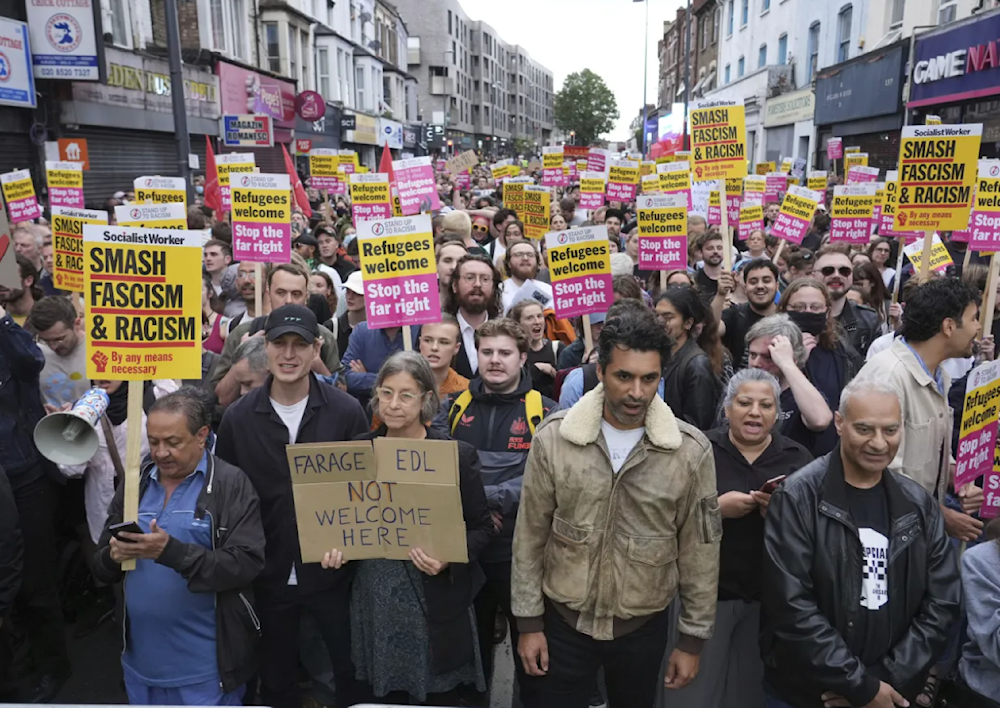Only one-third of UK anti-racism recommendations implemented
A Guardian investigation reveals that despite decades of major reports on UK racism with hundreds of recommendations, only about a third have been fully implemented.
-

Counter protesters gather in Walthamstow, London, on August 7, 2024, ahead of anti-immigration groups planning to target dozens of locations throughout the country following a week of rioting. (AP)
Only a third of recommendations from major reports aimed at tackling endemic racism in the UK over the past 40 years have been fully implemented, an investigation by The Guardian has found. Published ahead of the fifth anniversary of the Black Lives Matter protests, the analysis prompted experts involved in these inquiries to call on the government to break the “doom loop” of inaction.
Amid rising right-wing backlash against equality efforts, they urged ministers to act on the hundreds of ignored recommendations. The Guardian reviewed 12 reports commissioned since 1981, often triggered by scandals like the murder of Stephen Lawrence and the Windrush crisis.
Austerity and ignored recommendations fuel 'doom loop'
Out of nearly 600 recommendations covering education, business, health, criminal justice, and community cohesion, fewer than a third have been fully realized, while progress on many others has been reversed or weakened due to austerity measures. Just under a third remain unimplemented, with the rest only partially addressed in symbolic, limited, or inconsistent ways, or too vague to assess.
Labour MPs criticized this as a “performative cycle”, where a crisis led to reports meant to diffuse anger, but their recommendations are eventually ignored.
Ignored recommendations in numbers
Prof. Ted Cantle, who led a community cohesion review after the 2001 riots, revealed that only about 5% of his recommendations were fully implemented, with over a third ignored. He described this as a “doom loop” of recurring unrest and ignored solutions.
Following recent riots, Cantle reiterated his call for a dedicated government agency to develop and implement a national community cohesion strategy at both national and local levels.
Lord Victor Adebowale’s 2021 review on mental health and policing made 28 recommendations, but only about 14% have been fully implemented, with around a quarter ignored. He emphasized that a healthy society is an equitable one that understands and serves diverse communities.
Meanwhile, the rightwing Reform party gains and Keir Starmer’s immigration stance highlight ongoing tensions around equality and inclusion in the UK.
Decades-old calls for change largely unmet amid private sector progress
Adebowale highlighted that racial inequalities persist because successive governments refuse to acknowledge systemic racism, with Black people facing disproportionately worse health outcomes and detention rates. He believes that fully implementing his 27 recommendations could have prevented some deaths, while many past recommendations have been partially implemented but later abandoned or weakened.
According to The Guardian's study, certain suggestions made in official reports published since 1981 were first followed but then deleted or dramatically revised.
Many recommendations from the 2001 Cantle report were initially implemented under Blair and Brown, including Ofsted inspections for community cohesion and expanded early childhood support, but these programs were largely defunded or dismantled during austerity under later governments. Similarly, calls for safer restraint methods, like those in Adebowale’s report, have resurfaced repeatedly, yet deaths from restraint, including prone holds, continue to occur.
Early 2000s reforms undermined by austerity
Many of the recommendations The Guardian found were fully implemented were originally made decades ago and only acted upon after reappearing in two or even three subsequent reviews, sometimes taking 10 to 20 years to be addressed.
Meanwhile, other calls, such as for police forces and teaching staff to better reflect the communities they serve, or for school curricula to genuinely represent Britain’s racial diversity, have been repeatedly recommended but remain unfulfilled.
The Guardian’s analysis builds on earlier research by the Stuart Hall Foundation and the Centre for Public Data.

 4 Min Read
4 Min Read










